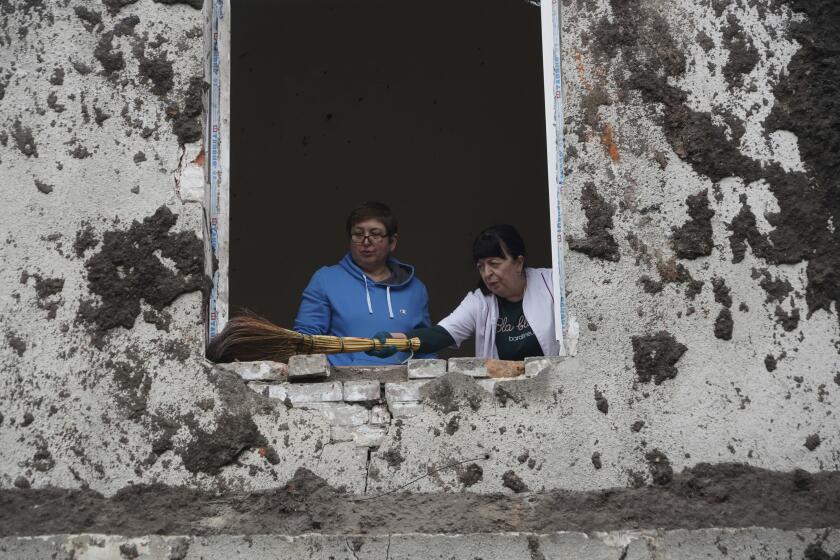In Ohio, Bosnia’s Paper Federation Becomes Real : Accord: After 20 months, central government and Muslim-Croat entity divvy up powers with U.S. signing.
With Bosnian President Alija Izetbegovic calling it “the day of our determination, the day of our hope,” Bosnia’s government agreed Friday to relinquish most civilian authority to a Muslim-Croat federation.
Although the federation has existed on paper for 20 months, the pact signed by leaders of Bosnia’s three warring factions at Wright-Patterson Air Force Base sets out its structure for the first time.
The pact assigns to the federation responsibility for education, police, courts, energy, industry, traffic, commerce, agriculture, health and refugees in territory controlled by Muslim and Croatian forces.
The agreement leaves the central government with responsibility for foreign policy, foreign trade, currency, air-traffic control and several other international functions.
Secretary of State Warren Christopher described the federation agreement as “an essential building block for peace in Bosnia-Herzegovina.”
U.S. officials said the pact seems to resolve most disputes between the Muslims and Croats, but it leaves unsettled the status of the rebel Bosnian Serbs, blamed by Washington for most of the atrocities in Europe’s bloodiest war in half a century.
But a senior Clinton Administration official said U.S. and European mediators hope to kick the talks “into fourth gear” over the weekend in an effort to reach an overall agreement by the end of next week.
Christopher held intensive meetings with all faction leaders Friday before returning to Washington late in the day, leaving Assistant Secretary of State Richard Holbrooke in charge of the U.S. delegation.
On the return flight to Washington, State Department spokesman Nicholas Burns told reporters that Christopher might postpone or cancel a scheduled trip to Japan next week if he were needed in Dayton to help close a deal.
Burns said Christopher is still scheduled to leave for Japan Tuesday, in advance of Clinton’s trip that begins Thursday, but “if negotiations precede to such an extent that he believes he can make more progress, he’ll come back.”
Although many details remain unsettled, the senior official said, “right now all these guys are acting like they want a deal.”
Leaders of Bosnia’s Muslim, Croatian and Serbian factions agreed in principle last month to divide the country roughly in half between the Serbs and the federation while retaining the central government as the symbol of “the internationally recognized state.”
But that plan leaves for the Dayton talks the nettlesome questions of how to split the territory and how to apportion powers between the factions and the central government.
Friday’s agreement seems to establish a pattern for division of powers that could also be applied to territory held by the Serbs.
But the position of Serbian President Slobodan Milosevic, who is acting as the representative of the Bosnian Serbs at the talks, became more complicated Thursday when the international war crimes tribunal meeting in The Hague indicted three officers of the Serb-led Yugoslav National Army for their part in a 1991 massacre in the Croatian city of Vukovar. Unlike the Bosnian Serb militiamen indicted earlier, Yugoslav army officers are under the authority of Milosevic’s government.
*
Burns said Christopher urged Milosevic to “cooperate with the war crimes tribunal,” presumably by turning the suspects over for trial.
Burns declined to characterize Milosevic’s response.
In a meeting with Croatian President Franjo Tudjman, Christopher called for a negotiated settlement of the controversy over Eastern Slavonia, the last slice of Croatian territory held by rebel Croatian Serbs. Tudjman has threatened to retake the territory by force if the dispute is not resolved by the end of the month, and Croatian troops are reported moving toward the enclave.
The Muslim-Croat federation agreement calls for the Croats to dismantle the trappings of a separate state, called Herzig-Bosna, which they established in the early days of the Balkans war.
European mediators said Croatian areas would end their use of Croatian currency, establishing the German mark as the unit of exchange throughout the federation.
The factions decided in principle to unite their armies but failed to agree on the way to do it.
As an annex to the pact, Muslims and Croats agreed to reunite the divided city of Mostar, scheduling citywide elections for April.
More to Read
Start your day right
Sign up for Essential California for news, features and recommendations from the L.A. Times and beyond in your inbox six days a week.
You may occasionally receive promotional content from the Los Angeles Times.






